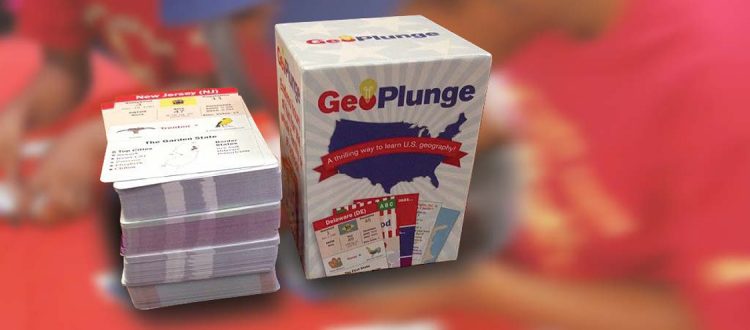4 Benefits of Game-Based Learning
Playing games is fun; playing games at school is even more fun! What better than to teach content through a game. Game-based learning in the classroom has been gathering steam for many years and engages students in a way that traditional teaching does not. Even in an era of digital solutions to just about everything, traditional card games provide an easy yet fun way to deliver content while at the same time creating an opportunity to build social skills in the classroom. Digital games in a classroom have drawbacks such as the need for access to working, high-speed internet and a classroom full of devices on which to play. In addition, digital games can be very solitary and isolating. There are many benefits beyond mastery of content which make game-based learning, especially non-digital formats, a MUST for any classroom.
 Student-Centered Learning
Student-Centered Learning
Gaming engages students through student-centered learning.
- Playing a game such as GeoPlunge enables students to become active participants in their learning as they are exposed to new content. There is no need for rote memorization of facts. On the contrary, students actively engage with content while playing games. The end result is a foundation of knowledge without the slog of flashcards or drills.
- Teachers can move from the role of lecturer to taking the position of being a learner alongside their students as they monitor, engage, and clarify.
- Game-based learning self-differentiates through a combination of strategy and chance that requires fluid decision-making. Those who are ready can advance at their own pace. Students can take their excitement to the next level by developing personalized methods of retaining information or strategies to outwit their competition. All the while, those who require additional repetition can still be successful while learning new material.
- A study published in the ASCD: Professional Learning and Community for Educators shows that gaming can enhance student achievement in certain environments. ( “The Art and Science of Teaching / Using Games to Enhance … – ASCD.” http://www.ascd.org/publications/educational-leadership/feb10/vol67/num05/Using-Games-to-Enhance-Student-Achievement.aspx. Accessed 5 Jul. 2017.)
Social-Emotional Growth through Development of “Soft” Skills
Non-digital gaming develops valuable soft skills. Soft skills can be defined as people skills and management skills, a group of personality traits that can include social graces, communication, language skills, habits, empathy, time management, teamwork and leadership. They may also include other traits such as a growth mindset, self-awareness, and resilience. Participating in a card game such as GeoPlunge allows players to develop these soft skills in a safe and nurturing environment. Players work as a team, practice oral communication skills, and learn to disagree, strategize, build consensus, and achieve a goal. In addition, they begin to gain valuable experience reading body language and other non-verbal cues from teammates or opponents. Players learn to fail gracefully but develop an understanding of what it takes to succeed in the future. Game-based learning boosts so many of these important soft skills.
Creating Low-Risk Competition
Gaming creates competition: Participating in a low-risk competition in a low-threat environment can build confidence in players. At GeoPlunge, we have been told repeatedly that some students who played our game in the classroom gained confidence and then began participating more actively in other areas of their school life.
Feedback, Feedback, Feedback
Gaming generates several forms of feedback. Teachers may use observations and student feedback as a valuable formative assessment of their understanding of content. Teachers may then use the data to identify areas of focus for whole-group, small-group, or individual instruction. Players should also practice self-reflection. Let’s face it; when playing a game, we know when we are good at it or could use a little more practice. After playing any game, players should take a minute to reflect on their performance and how to improve the next time around.
Game-based activities can jazz up the atmosphere of any classroom while at the same time deliver content and build social skills. It should be a part of every teacher’s arsenal of teaching tricks.
 Barb Bailey is the Director of Learning at LearningPlunge, Inc. She has a Master of Education degree and 15 years of teaching experience. Barb is committed to providing high quality educational resources for all children. Reach out to her at [email protected].
Barb Bailey is the Director of Learning at LearningPlunge, Inc. She has a Master of Education degree and 15 years of teaching experience. Barb is committed to providing high quality educational resources for all children. Reach out to her at [email protected].









